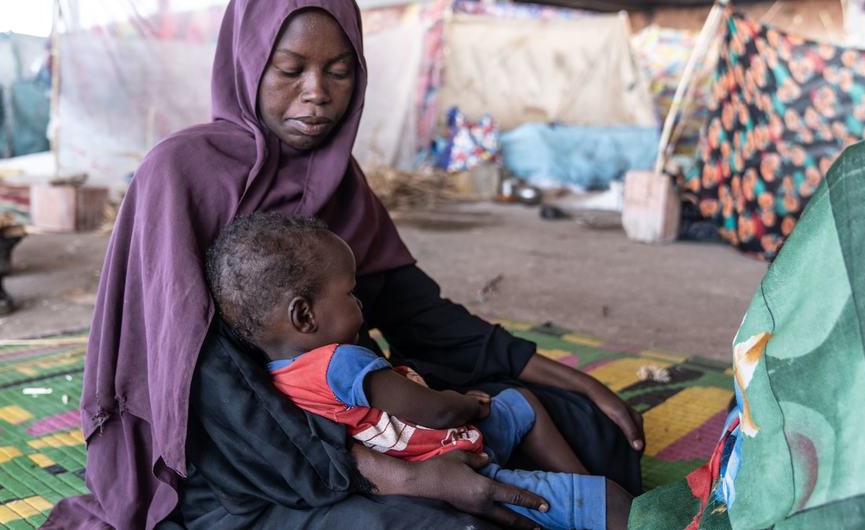Durban — The two-year conflict between the Sudanese Armed Forces and paramilitary Rapid Support Forces plunged the country’s humanitarian, infrastructure, and healthcare systems into a deep crisis.
The war triggered the world’s largest displacement crisis, with more than 13 million people uprooted within the country and four million seeking refuge in neighbouring countries such as Chad, Egypt, Ethiopia, and South Sudan. Most of those displaced are women and children.
Sudan’s healthcare system was dismantled, leaving millions in urgent need of medical care.
Follow us on WhatsApp | LinkedIn for the latest headlines
There is also a serious food shortage, a high rate of gender-based violence, and a lack of education, healthcare, and job opportunities for many communities. According to the UN, the number of people at risk of gender-based violence has tripled in less than two years. Conflict-related sexual violence is largely under-reported, even though there is growing evidence that it is often used as a weapon of war. In the areas hardest hit, women and girls are suffering the most due to increased hunger and limited access to food, basic goods, and services.
The UN has described Sudan’s war as both a “forgotten war” and “one of the worst humanitarian nightmares in recent history.”
The healthcare sector, in particular, has been devastated.
Between 70% and 80% of health facilities in conflict-affected regions are either barely functioning or completely closed. Approximately 4.5 million children under five and pregnant women suffering from severe malnutrition are at heightened risk of death due to the collapse of essential health services. Women’s access to sexual and reproductive healthcare has been severely curtailed. At least two-thirds of Sudan’s 18 states are grappling with multiple disease outbreaks, including cholera, malaria, and measles.
Dr. Mihad Nusreddin, a community medicine physician from Sudan and head of SMAfrica, a non-profit that has worked for over a decade to improve health access and youth empowerment, as well as an advisor to the Director General of the West Africa Institute of Public Health, said that the conflict in Sudan has had a “devastating impact” on health services and outcomes.
“Millions have been displaced, and many health facilities are damaged, non-functional, or simply inaccessible due to insecurity,” Dr. Nusreddin said. “Essential services such as maternal and child health care, immunizations, and treatment of chronic diseases have been severely disrupted.”
She said that the collapse of infrastructure and displacement have compounded other public health risks. “You can notice easily that the limited access to safe water, sanitation, and shelter has increased the risk of outbreaks, including cholera and measles, while mental health needs are ‘rising sharply’ among displaced populations,” she said.
According to Dr. Nusreddin, the breakdown of the health system is threatening years of progress in immunization coverage and disease surveillance, leaving communities more vulnerable to future epidemics. Despite the dire situation, she said that “national and regional partners, including Africa CDC, continue to support emergency health operations, strengthen disease surveillance, and mobilize resources to maintain life-saving services under extremely difficult conditions.”
Dr. Nusreddin spoke of the importance of coordination when talking about how Africa CDC and regional mechanisms, such as the Incident Management Support Team (IMST), can mitigate the health impacts of Sudan’s conflict.
IMST is a group of experts that provides technical and operational support to manage public health emergencies, such as outbreaks of diseases like mpox and cholera. These teams are often deployed by organizations like the Africa CDC and the WHO to help with response efforts by producing situation reports, coordinating actions, and leading the technical and operational aspects of managing the crisis.
“Africa CDC’s approach focuses on regional solidarity and coordinated action,” she said.”The IMST model helps countries rapidly assess needs, coordinate emergency responses, and share critical health data across borders. This mechanism strengthens outbreak detection and response, ensuring that displacement or cross-border movement does not trigger wider regional health emergencies.”
State of total collapse
She also shared the immense challenges faced by doctors and medical staff on the ground.
Medical staff and doctors in Sudan are under constant threat as a result of the ongoing conflict, and their safety is at risk. More than 165 health facilities have been damaged or destroyed by shelling and drone strikes, resulting in the deaths of numerous healthcare workers. The abduction and assault of medical professionals have caused severe staff shortages in the few facilities left functioning, as many health workers fear for their lives. Disruptions in medical training have also weakened Sudan’s already fragile public health infrastructure, deepening the country’s mounting health emergency.
In Khartoum, nearly half of all hospitals are no longer operational, with medical supplies critically low and most of the workforce displaced. The delivery of healthcare continues to be hampered by insecurity, displacement, and a lack of resources throughout the country.
Dr. Nusreddin said that the main challenges are insecurity and limited resources. She added that even basic medical supplies like gloves, cotton, drips, normal saline, and pain relief medications are often unavailable. The country’s health system is breaking down under the weight of the fighting that has raged since mid-April, according to GAVI.
She said that supporting and empowering healthcare workers is critical to sustaining service delivery amid the crisis.
“Doctors and healthcare professionals are the main players at the front line,” she said. “If we truly want a patient-centered approach, we must support and strengthen the people who connect with patients directly and provide care under these extremely tough conditions.”
Looking ahead, Dr. Nusreddin said she hopes that the 2025 Conference on Public Health in Africa (CPHIA) and regional engagements will lead to stronger collaboration and governance.
“I really hope we achieve better integration of efforts, more coordination, and knowledge sharing, learning from each country’s success stories so we can adapt them back home,” she said. “Gatherings like this are vital for strengthening governance structures and bringing voices together.”
allAfrica is a media partner of the CPHIA 2025.


